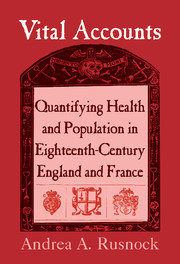Book contents
- Frontmatter
- Contents
- List of Illustrations
- Acknowledgments
- Vital Accounts
- Introduction
- 1 A New Science: Political Arithmetic
- PART ONE SMALLPOX INOCULATION AND MEDICAL ARITHMETIC
- PART TWO MEDICAL ARITHMETIC AND ENVIRONMENTAL MEDICINE
- 5 Medical Meteorology: Accounting for the Weather and Disease
- 6 Interrogating Death: Disease, Mortality, and Environment
- PART THREE POLITICAL ARITHMETIC
- Conclusion
- Bibliography
- Index
- Titles in the series
5 - Medical Meteorology: Accounting for the Weather and Disease
Published online by Cambridge University Press: 15 October 2009
- Frontmatter
- Contents
- List of Illustrations
- Acknowledgments
- Vital Accounts
- Introduction
- 1 A New Science: Political Arithmetic
- PART ONE SMALLPOX INOCULATION AND MEDICAL ARITHMETIC
- PART TWO MEDICAL ARITHMETIC AND ENVIRONMENTAL MEDICINE
- 5 Medical Meteorology: Accounting for the Weather and Disease
- 6 Interrogating Death: Disease, Mortality, and Environment
- PART THREE POLITICAL ARITHMETIC
- Conclusion
- Bibliography
- Index
- Titles in the series
Summary
The fear of epidemics inspired physicians, natural philosophers, and government officials to study the effects of weather on health, or, in other words, medical meteorology. These individuals were strongly influenced by prevalent Hippocratic ideas about the link between the environment and the incidence and mortality of different diseases. Medical meteorologists took a passionate interest in recording weather and disease observations often over a period of several years, and most of their accounts included quantitative information.
The motivation for this quantitative approach came in part from the relatively new belief that numbers, the tabular display of numbers, and the comparison of numbers would yield new knowledge about the causes and courses of epidemics and other diseases. Two developments undergirded this trust in numbers. First, the creation of techniques to analyze mortality numerically (initiated by John Graunt and successfully deployed by James Jurin in the inoculation debates) had set a new model for medicine. Second, the invention of instruments to measure temperature, air pressure, and humidity had transformed the study of meteorology. Developed over the course of the seventeenth century by many natural philosophers, including Galileo, Torricelli, Huygens, Hooke, and Wren, these instruments frequently incorporated numerical scales into their design, thus allowing for the quantification of weather phenomena.
- Type
- Chapter
- Information
- Vital AccountsQuantifying Health and Population in Eighteenth-Century England and France, pp. 109 - 136Publisher: Cambridge University PressPrint publication year: 2002
- 2
- Cited by

